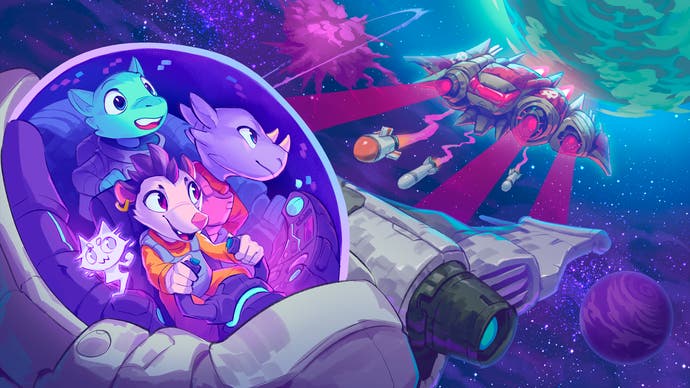Cobalt Core review - ingenious little deck-builder that reaches the stars
Opossum! My possum!
Earth has a space junk problem. With each new rocket launch, or decommissioned satellite, we add more detritus to high orbit. Already satellites sometimes collide and one day, or so I've read, there'll be so much flotsam up there we'll be earthbound; unable to launch new spacecraft through a prison of shrapnel. Anyway, I'm no rocket scientist, but this does seem an apt metaphor for today's games market. Back in the day there were few enough new indies that games like Super Meat Boy, Crimzon Clover or FTL went straight to the moon. Today we're blessed with so many launches that it's hard to spot the gems among the debris.
Nowhere is this truer than the deck-builder genre. Slay the Spire, 2017's roguelike indie darling, made such an impact with its spontaneous cardplay that it blasted 1001 other deck-builders into the atmosphere. In the half-decade since, it's barely been touched. Monster Train and Inscryption have come close. But nothing has yet landed the very same way and, for each successful take-off, there have been scores of spaceX style catastrophes. Against this celestial backdrop, then, enter Cobalt Core, a plucky cosmic roguelike from a little-known, three-person dev team, which maybe, just maybe, earns a place among the constellations.
If you've played Slay the Spire or any of its lineage, Cobalt Core's premise will be familiar: Navigate a bifurcating map of random encounters and random events, collecting gameplay-altering artefacts and adding cards to your deck (Pro tip: Less is more! Don't take cards you don't need!) while preparing for a show stopping boss battle at the summit. Cobalt Core's literal twist on the genre is that card battles take place on a 2D grid. Two spaceships face each other in a dogfight, with a row of asteroids, rockets or murderous drones between them. You spend cards and resources clacking these around like a Rubik's Cube, positioning your ship beyond range of enemy gunfire, launching drones to harry or cover weak-spots, then lining up your own lethal cannons with the enemy's exhaust ports and pulling the trigger. It's responsive, precise - perfectly calibrated for gamepad - and all this rowshifting drifts you into a meditative flowstate as you flip and twist the playfield in rhythm to the stellar ambient soundtrack. A raft of clever little complications - shields, weak-points, hull-corroding acids, dodge mechanics and deck manipulation - add genuine strategic depth and nuance. The line between explosive victory and inglorious defeat often hangs on small moments of inspiration, cleverly meshing different systems together.
Cobalt Core's second innovation is its smart synthesis of narrative and gameplay, centred on a motley crew of intrepid space critters. You can only pick three of eight total crew members per run, and each brings along unique cardsets and mechanics that synergise in interesting and unexpected ways. There's Riggs, the scatterbrained possum pilot, whose cards let you whiz your spacecraft around the screen and rapidly cycle through your deck. There's Dizzy, the lizardy science officer, whose shield and return-fire mechanics let you turtle enemy assaults, absorbing shots and responding with answering volleys. There's Drake, a hot-tempered draconic sellsword, who pumps out increased damage at the cost of your own ship's hull. Or rocket-ram Isaac, who fires missiles, launches killer drones and uses solar winds to manipulate protective asteroid belts. There are space wizards and computer hacking llamas and rhinos manning the cannons, all of it overseen by the cute AI cat at the centre of the mystery.
The game's narrative, though chipper, is an ultimately melancholy little sci-fi yarn about time loops and space buccaneers, meted out, bit by bit, over consecutive runs. Each time you bring down the final boss and close the loop, you get to peek into the memories of one current crew-member. This not only brings narrative flavour, it encourages you to mix and match cardsets, experimenting with different play-styles and strategies as you unknot the whole tale. It's a lovely marriage of story and gameplay and, while the plot is a shade muddled until you've finished the jigsaw, the character writing is genuinely witty, quippy and sweet. Mix in a bit of wibbly wobbly timey wimey 'me-from-the-future' stuff and you get the perfect amount of texture and gristle to act as backdrop for a genre traditionally defined by gameplay.
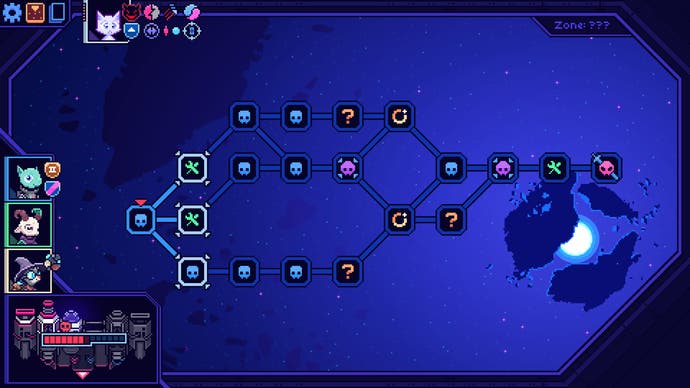
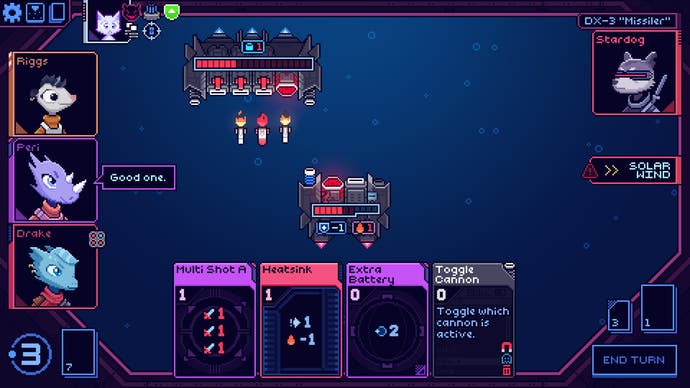

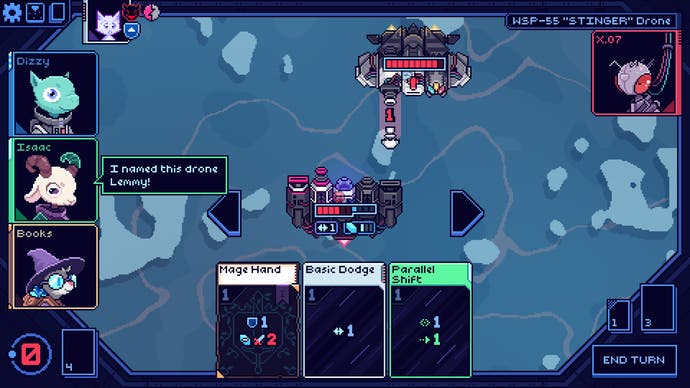
Of course, all this means narrative progress is tied to finished runs which, for deck-building newcomers, may be challenging. But, once you've found your feet, full loops usually clock in under an hour. The game is generous with health regeneration, and easier difficulty settings are forgiving enough to trial-and-error your way through the basics (Pro tip: Remove unnecessary cards! Do not add unnecessary cards!).
Wrangling this intergalactic zoo also provides nice meta-progression, as each crew member beyond the starting trio has unique unlock conditions. You can also score new ships, FTL style, which all feature a smart, imaginative manipulation of the core systems. There's a gunless drone carrier, a warship with flippable cannons, and a pirate vessel that keens left and right as you play cards from the corresponding sides of your hand. There's also a symmetrical bicolour gun-galley that flips polarity with each card you play, letting you spit out consecutive drones... or fumble the cadence and fire all your rockets into the void of space.
Of course, the true joy of the roguelike is breaking things. Cobbling together a build so absurdly busted that you become godlike, downing once impossible bosses with a few flicks of the shoulder buttons. And this secret sauce is distributed liberally. I've had runs with near-infinite card draw, cycling through my deck five times in a row, then delivering the coup de grace with a single blast from a powered-up charge beam. I've built ships that spew dozens of drones per turn, then obliterate the enemy in one glorious volley of cannon fire. There are iron fortress builds, where you spray corrosive acid then full-power the shields, sloughing off cannon fire while poison shreds their cockpit. There are builds that let you resurrect hyper-powerful once-a-game last resort cards repeatedly, which you can mix with brutal lifesteal attacks if you happen to meet a certain undead someone.
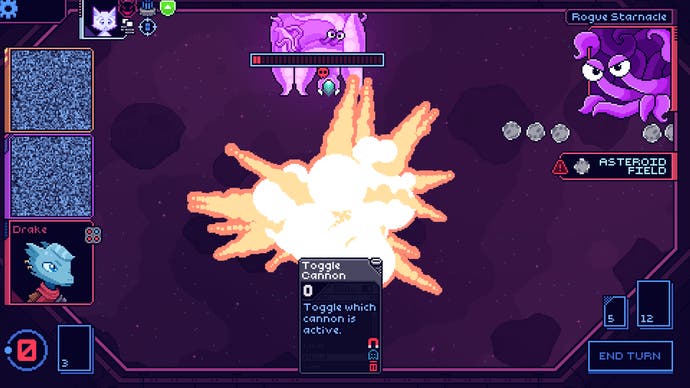
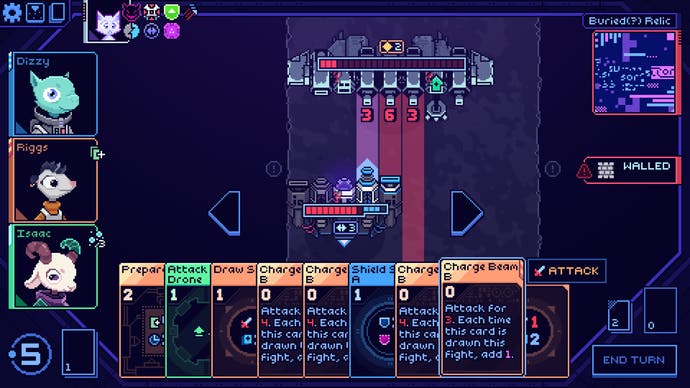
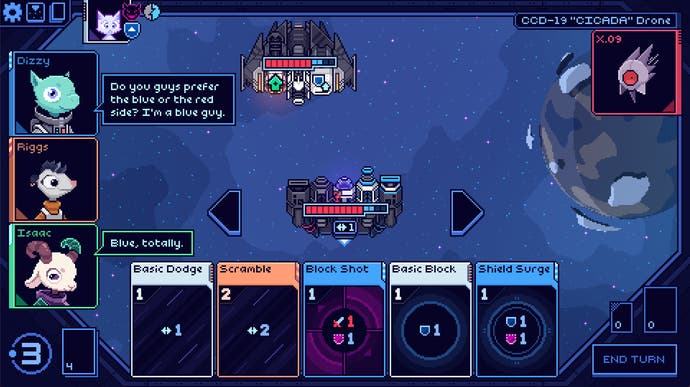
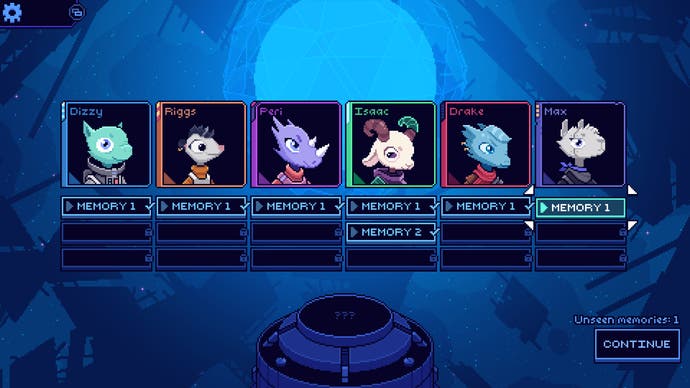
Of course, assembling these recipes requires luck, spontaneity and willingness to switch strategy on a dice-roll. Often, those dice roll snake eyes, and you're left limping through sequential skin-of-your-teeth encounters with a cardboard shield and a peashooter, one health left and sweaty palms at the victory screen. And, of course, true to the genre, prepare to go down in flames repeatedly, especially on the hardest difficulty which is tough. But trickier loops are still a good time, and make those glorious 'this-feels-like-cheating' pop-offs that much sweeter.
So then does Cobalt Core finally take that Slay the Spire crown? Does it fly us to Alpha Centauri? Well, putting on my NASA engineer's hardhat for a second, there are a few frictions slowing Cobalt Core's ascent. Although there's a seemingly inexhaustible wellspring of fresh character interactions and delightful random events, by the 20th run you'll start to get tired of the same boss-fights. Enemy encounters all have satisfying and singular gimmicks: rapid fire mining rigs hiding behind asteroid belts, zippy warpdrive crafts that boost out of range, and a very flustered frog with a rocket malfunction. But it's just shy of enough variety to flesh out the 18 full loops and innumerable abortive missions needed to complete the game. Most character classes are well-tuned, but the hand manipulation tricks particular to hacker-llama Max are half-cocked, shuffling your cards from one suboptimal configuration to another. Also, without a quick undo button, it's very easy, in contemplative moments, to rest one's chin on the gamepad, inadvertently clipping an input and delivering your ship into the maw of oblivion.

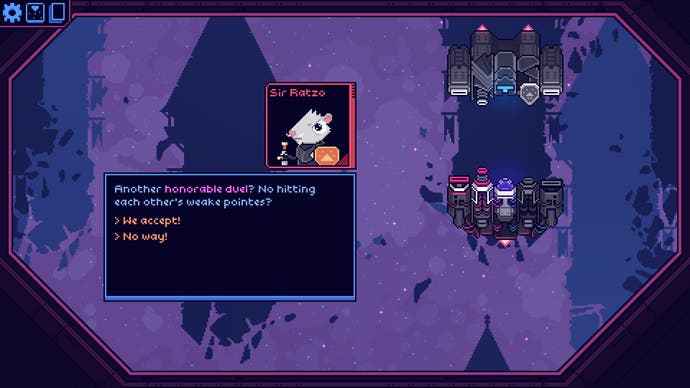
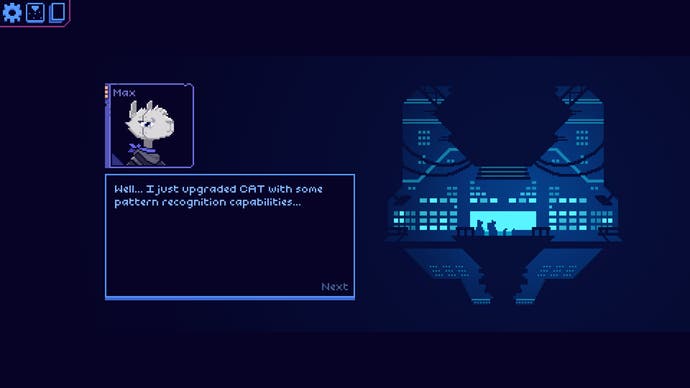
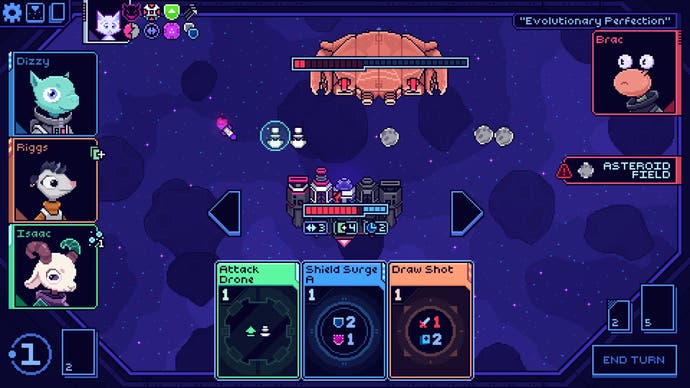
Really though, these are quibbles. If you haven't already guessed from my breathily singing its praises, this one stuck the landing. Cobalt Core is a triumph of roguelike engineering. It doesn't, in truth, knock Slay the Spire from the heavens. But it comes closer than any other deck-builder has yet, and brings a charm and clockwork precision all of its own. Its place is in the pantheon, then, alongside other Titans like FTL, Into the Breach and Darkest Dungeon. So lest it be lost in the debris, or hidden behind the hulks of heftier vessels, I'm sending out a beacon. If you're searching for a card shuffler to play over the holidays, Cobalt Core should be on your radar. Houston, we have a good one. Initiate launch. Get ready for liftoff. This game is heading for the stars.
Eurogamer sourced its own copy of Cobalt Core for this review.
